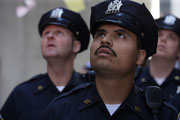 What happened on September 11th, 2001, didn’t just leave its mark on the New York City skyline, it scarred a nation. Everyone has a story. We all remember where we were the moment we learned the twin towers had come down, some even watched the buildings fall, and a select few recall mustering the courage to go in and attempt to rescue those still trapped in the concrete and steel. If anyone deserves to have their story told, it’s the brave men and women who put their lives on the line that fateful day.
What happened on September 11th, 2001, didn’t just leave its mark on the New York City skyline, it scarred a nation. Everyone has a story. We all remember where we were the moment we learned the twin towers had come down, some even watched the buildings fall, and a select few recall mustering the courage to go in and attempt to rescue those still trapped in the concrete and steel. If anyone deserves to have their story told, it’s the brave men and women who put their lives on the line that fateful day.
Such is the impetus behind Oliver Stone’s “World Trade Center,” a film devoted to the accurate re-telling of the story of Port Authority Police Department Sergeant John McLoughlin and Officer Will Jimeno. Both men were part of a valiant crew who ventured into the concourse of the World Trade Center after the first tower was hit, having little idea of what was actually going on, knowing only that they had a job to do.
Walking into the theater, my skepticism caused me to put up a wall. I had no intention of letting my emotions get the better of me, nor did I have an overwhelming desire to recall the psychologically exhausting experience of that horrible Tuesday. Much like the rest of the nation, I remember 9/11 with startling clarity, and the film’s degree of honesty and unromantic execution make for a downright eerie recreation of events.
“World Trade Center” begins as innocently as the morning itself, but there exists a general discomfort in knowing precisely what is about to take place. Thankfully, special effects are used sparingly, merely intended to illustrate rather than exploit the magnitude of the attacks. That’s not to say anything is omitted entirely. In fact, the film should be applauded for its choices in what the audience gets to see and what it doesn’t.
Although overly emotional at times (but that’s to be expected), nothing about the characters or their actions feels particularly forced. For the most part, the actors offer honest portrayals of real people working together in a time of crisis. Unlike “United 93,” however, which used virtual unknowns to bolster its realism, “World Trade Center” misguidedly features big names like Nicolas Cage and Maggie Gyllenhaal, whose presence actually serves as a distraction from both the subject matter and the other fine performances. Stone may be asking a little too much in urging us to believe A-list actors are real people.
But realism is truly call called into question on the subject of religion. There’s little doubt that faith played an important role in the recovery efforts of 9/11, so it’s no surprise it should make an appearance in “World Trade Center.” But the inclusion of faith is, for the most part, pegged to one or two people, making the presence of anything spiritual seem compartmentalized. As such, it’s an underused element, and, sadly, made for some of the film’s only truly awkward or out-of-place moments.
Equal parts terrifying and uplifting, “World Trade Center” sets out to tell a story of hope amid the ruin, and, for the most part, succeeds. There are no teary-eyed monologues or melodramatic, angst-ridden moments, just moving portrayals of real people facing one of history’s most catastrophic events. If you can find the courage to sit in a darkened theater and relive September 11, 2001, “World Trade Center” is definitely a film worth seeing.

